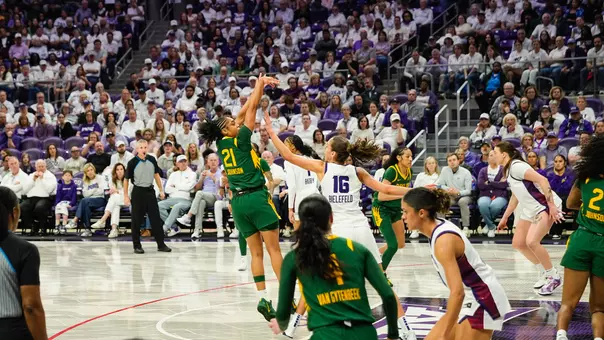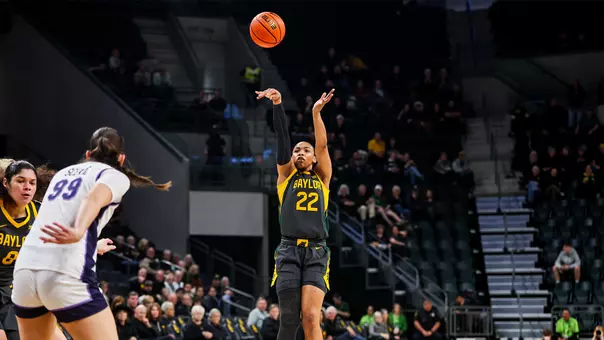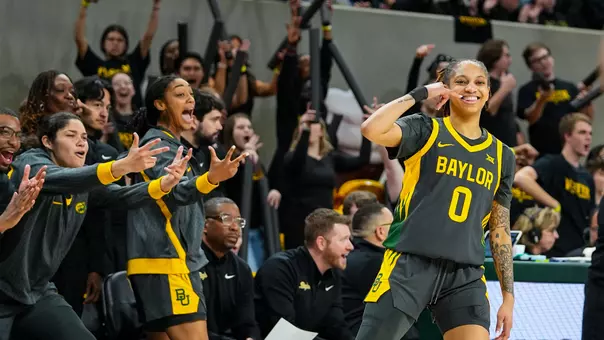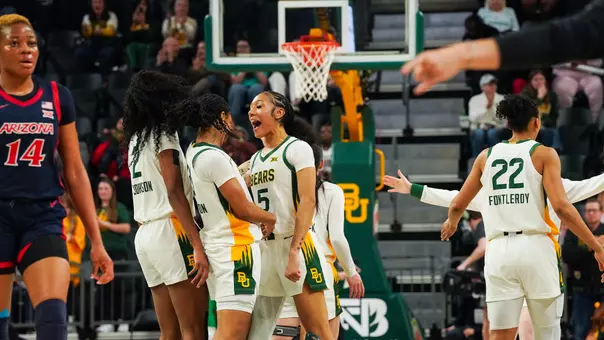Kim Mulkey-Robertson Quotes
3/30/2005 12:00:00 AM | Women's Basketball
March 30, 2005
Going back to November, LSU had two games under its belt and it was your season opener and it seemed to show in the first half. Do you feel like you just ran out of time?
"No, actually if you remember we had the ball in our hands to win the game. They were up one and we had the last shot - we just didn't execute the play. It wasn't the case of time running out, it was the case of a great comeback and an opportunity to win the game, we just didn't get it done."
What's going to be different Sunday?
"Well, I hope we don't get down 20 like we did in the first half against them. Both teams are playing very well. (LSU), in my opinion, is the best team in the country - they have the best player in the country on their team, they have the best freshman in the country on their team and what we hope to do is play a little bit better against them in the first half than we did earlier in the year."
When you came to the state with two legendary coaches at Texas and Texas Tech and the success of their programs, what made you think you could come to Baylor and have that kind of success?
"I don't know that I thought I could come in here and have that kind of success, I just wanted to coach my own program and Baylor happened to be the school that called at the right time. We think the Big 12 is one of the best leagues in the country, we lead the country in fan attendance, and you're right we have Jody Conradt and Marsha Sharp. What two legends of the game are better than that? To be able to coach against them and compete against their teams is only going to make you better."
Is this a new era in women's basketball, where we are seeing teams like Baylor and Michigan State in the Final Four?
"I don't know if `era' is the word I would use, I think there's just parity now in women's basketball. We've talked about it for many years, I think each year you just have players that go and help build programs for whatever reason. The more parity there is in the women's game, the more exposure we're each going to get, it gets better and better."
On LSU's Seimone Augustus:
"Like I said earlier in the year when we played them, you just have to say a lot of prayers. You have to hope that she either gets in foul trouble or misses a lot of shots, because I'm not sure anyone has stopped her yet. My opinion of Seimone Augustus hasn't changed since I watched her in high school, she's just a phenomenal player. She's the best player in the game right now, and we're going to do the best job we can in defending her. I'm not sure you do stop Seimone Augustus, if somebody has I wish they would give me a call and tell me what the secret was.
"I think our defense has been pretty special throughout the end of the season - at the Big 12 Tournament and into the playoffs. You're not going to guard Seimone Augustus all night for 40 minutes with one player, you're going to have to put different people on her and do the best we can. With their motion offense, they set a lot of picks a lot of backdoors. We've got to have tremendous help from everyone on that floor."
Before last season you challenged your team to be the "Shining Light," do you believe your accomplishments over the past two seasons have let the "light shine in" so to speak?
"We happened to be the next sport to play after the tragedy. I just felt we needed to take the focus off the tragedy the best we could and continue to do what we were hired to do here as coaches and that's to win basketball games. We made a run through the playoffs and it didn't end the way we would have liked, but we learned so much from that and we gained valuable experience. There are great coaches over here at Baylor - you don't win a tennis national championship without a great coach, you don't have as many Olympians as Clyde Hart has if you're not a good coach. Softball went to the NCAA Tournament, I mean there's a lot of feel-good stories at Baylor, and we just did our job as coaches."
Do you think dealing with that (tragedy) has made your players better over the last two years, dealing with the negative impressions and turning them into positive impressions?
"No, not at all. I think our players are good players that developed with or without the tragedy. We just wanted to win. That's what we were hired to do and that's what these players came here to do. It wasn't like we got motivated by it in the locker room or used that as motivation. We just went to work and rolled up our sleeves and competed."
How often do you get back home?
"I don't get home as often as I wish I could. I miss crawfish, I miss seafood. Every April we have a crawfish boil and they travel with about 200-300 pounds of live crawfish. Now with the Final Four I guess we're going to have to delay that crawfish boil."
Can you talk about the impact of the Blackmon sisters on your program?
"Steffanie and Tiffanie Blackmon were in that first four-year recruiting class that we signed at Baylor. When I was recruiting them, I made it perfectly clear to both of them and to their parents that I would not sign one without the other. I wanted both of those young ladies in my program and they are still involved in my program. Tiffanie had the career-ending Achilles injury, but she's still a student assistant and part of my staff and very much a part of this basketball team. Steffanie was able to come back from her injury, and I'm so grateful to both of them because I don't how many school offered (scholarships to) both of them, but from the beginning we never wavered that we wanted both of them in our program."
What is the impact of the women's basketball program going to the Final Four?
"You would be better to ask people away from me, because I can be partial. It's an exciting time, the Final Four is what you play for, it's what you coach for. Some people coach or play a lifetime and never get to reach the highlight of what it's all about. We're excited, the community's excited, Baylor's excited and we should be."
When you got to Baylor and looked at what you had, did you put a timetable on when you could get to a Final Four?
"No, we inherited a program that had won seven games the year before. There was no way I could put a timetable on it. What I did immediately was hire a great staff and said, `Look, we're at the bottom of the Big 12, we can only go up, so let's get to the middle of the pack as quickly as possible without saying let's do it in two years or three years. We moved up to the middle of the pack, got some sleepers in recruiting, because we understood what our strengths and weaknesses were. We couldn't go out and sell this program, we got players who wanted to play immediately and who wanted a quality education from Baylor. It's happened rapidly and I don't any of us expected it to happen this quickly."
After going to the Final Four as a player and an assistant coach, how special is it to take your own team there?
"It's special. A lot of times coaches will take teams to Final Fours and they've inherited the talent. These are players that this staff recruited and we've done it the right way. Five years seems quick, but to a coach it seems like an eternity with all of the hours you spend recruiting. It's not going to be any more special for me just because I'm the head coach. It was special for me as an assistant, as an associate head coach, as a player - this is what you dream of doing. To think that we can go and represent Baylor University is pretty amazing."



















